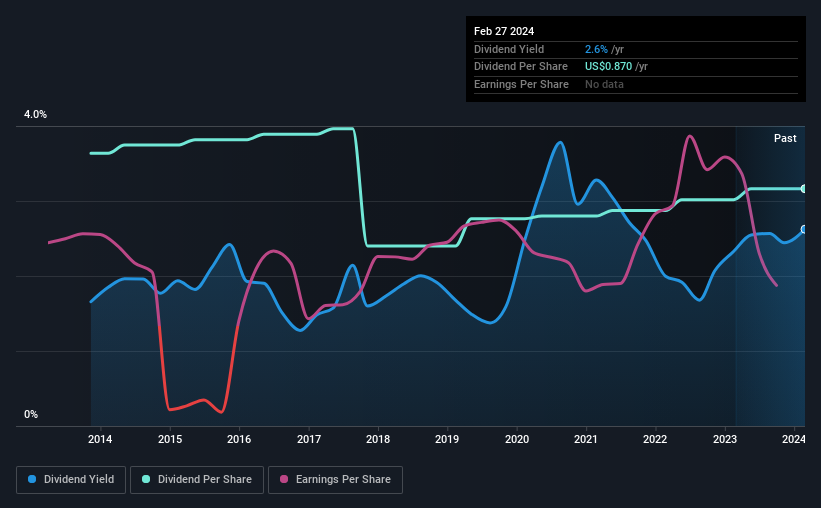Two Days Left To Buy NACCO Industries, Inc. (NYSE:NC) Before The Ex-Dividend Date
NACCO Industries, Inc. (NYSE:NC) is about to trade ex-dividend in the next two days. The ex-dividend date is one business day before the record date, which is the cut-off date for shareholders to be present on the company's books to be eligible for a dividend payment. The ex-dividend date is important because any transaction on a stock needs to have been settled before the record date in order to be eligible for a dividend. Thus, you can purchase NACCO Industries' shares before the 1st of March in order to receive the dividend, which the company will pay on the 15th of March.
The company's next dividend payment will be US$0.2175 per share. Last year, in total, the company distributed US$0.87 to shareholders. Calculating the last year's worth of payments shows that NACCO Industries has a trailing yield of 2.6% on the current share price of US$33.16. Dividends are a major contributor to investment returns for long term holders, but only if the dividend continues to be paid. So we need to investigate whether NACCO Industries can afford its dividend, and if the dividend could grow.
View our latest analysis for NACCO Industries
Dividends are typically paid from company earnings. If a company pays more in dividends than it earned in profit, then the dividend could be unsustainable. NACCO Industries paid out a comfortable 35% of its profit last year. Yet cash flow is typically more important than profit for assessing dividend sustainability, so we should always check if the company generated enough cash to afford its dividend. Luckily it paid out just 25% of its free cash flow last year.
It's encouraging to see that the dividend is covered by both profit and cash flow. This generally suggests the dividend is sustainable, as long as earnings don't drop precipitously.
Click here to see how much of its profit NACCO Industries paid out over the last 12 months.
Have Earnings And Dividends Been Growing?
When earnings decline, dividend companies become much harder to analyse and own safely. If business enters a downturn and the dividend is cut, the company could see its value fall precipitously. Readers will understand then, why we're concerned to see NACCO Industries's earnings per share have dropped 10% a year over the past five years. Such a sharp decline casts doubt on the future sustainability of the dividend.
Many investors will assess a company's dividend performance by evaluating how much the dividend payments have changed over time. NACCO Industries has seen its dividend decline 1.4% per annum on average over the past 10 years, which is not great to see.
Final Takeaway
Should investors buy NACCO Industries for the upcoming dividend? Earnings per share are down meaningfully, although at least the company is paying out a low and conservative percentage of both its earnings and cash flow. It's definitely not great to see earnings falling, but at least there may be some buffer before the dividend needs to be cut. In summary, while it has some positive characteristics, we're not inclined to race out and buy NACCO Industries today.
While it's tempting to invest in NACCO Industries for the dividends alone, you should always be mindful of the risks involved. Case in point: We've spotted 4 warning signs for NACCO Industries you should be aware of.
If you're in the market for strong dividend payers, we recommend checking our selection of top dividend stocks.
Have feedback on this article? Concerned about the content? Get in touch with us directly. Alternatively, email editorial-team (at) simplywallst.com.
This article by Simply Wall St is general in nature. We provide commentary based on historical data and analyst forecasts only using an unbiased methodology and our articles are not intended to be financial advice. It does not constitute a recommendation to buy or sell any stock, and does not take account of your objectives, or your financial situation. We aim to bring you long-term focused analysis driven by fundamental data. Note that our analysis may not factor in the latest price-sensitive company announcements or qualitative material. Simply Wall St has no position in any stocks mentioned.

